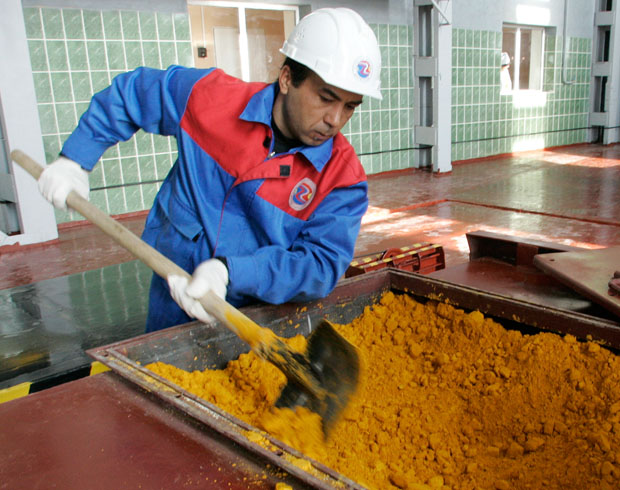
Kazakhstan Completes Major Uranium and Rare Earths Deals with Japan
Publication: Eurasia Daily Monitor Volume: 9 Issue: 144
By:

Major deals in uranium and rare earths are not normally thought of as having important political content, but in the case of Kazakhstan’s recent deals with Japan that is true for both sides. In fact these deals, apart from their mutually beneficial economic interests, highlight the fact that in Asia – where mercantilist policies are pervasive – particularly foreign trade and investment are often thought of as political strategies and used accordingly. For example, the consistency of Kazakhstan’s multi-vector foreign policy for over twenty years has been exemplary, and one of its key tenets is to avoid excessive dependence upon either Russia or China in foreign economic matters. In addition, Astana seeks to cultivate the widest possible network of mutually beneficial relations with foreign governments to enhance Kazakhstan’s economic power and attractiveness to foreign investment (Kazakhstani Foreign Minister Yerzhan Kazykhanov, Japan Times, December 16, 2011). Given Kazakhstan’s huge endowment of natural resources and need for foreign investment, this has proven to be an insightful foreign policy.
In March of this year, Kazakhstan’s State Secretary Kanat Saudabayev told Japanese media that his country planned to increase its share of Japan’s uranium market from 3-4 percent up to 40 percent. In the coming years, approximately 30 percent of these uranium exports would be “highly processed products” (RIA Novosti, March 24). According to Saudabyev, the export goals were based on a package of documents that was signed between Kazakhstan’s nuclear import/export giant, Kazatomprom, and several Japanese atomic sector companies.
Since 2009, Kazakhstan has become the world’s largest producer of uranium, and it has begun to set its sights upon becoming a major exporter given the continuing rising demand for nuclear power in Europe and Asia. This demand has not really slackened, except briefly, in the wake of the 2011 Fukushima disaster in Japan. Already in 2010, Sumitomo Corporation began a feasibility study on the prospects for Japanese imports of uranium through the Russian Far East. Now, despite the Fukushima disaster, Japan has reaffirmed its intention to take possession of the uranium it had previously contracted for. Indeed, Kazakhstan’s state company Kazatomprom plans to more than double its capital expenditures to $542 million this year from about $220 million in 2011 (Yomiuri.co.jp, Mainichi.jp, May 2; mining.com, May 1; Reuters, April 29).
Similarly Kazakhstan is poised for a huge expansion in the rare earths sector, again particularly with Japan. The Central Asian republic is continuing Japan’s existing deals with Sumitomo and Toshiba to extract metals like molybdenum, rhenium and beryllium – all rare earths used in advanced weapons and technologies. Japan and Kazakhstan will also jointly build a plant in the northern Kazakhstani city of Stepnogorsk, which will isolate dysprosium, a rare earth metal used in electric and hybrid car engines. The plant is set to export 30 tons of dysprosium to Japan annually, which may increase by next year to 50 tons annually – roughly ten percent of Japan’s yearly demand. But Kazakhstan also recently signed a strategic partnership agreement worth 3 billion euros ($3.7 billion) with Germany to prospect for and develop rare earths and other minerals, and this is on top of expanding Kazakhstani-German trade of 6.3 billion euros ($8.5 billion) in 2011 (https://www.edgekz.com/kazakhstan-poised-for-rare-earth-boom.html). France too is jointly developing rare earths with Kazakhstan in a deal that looks forward to joint production. Just as in the case of uranium, demand for these rare earths is expected to grow substantially in the coming years, allowing Kazakhstan to reap a bonanza from deals with major importers and growing economies.
These deals possess not just economic significance but also important political benefits for both Astana and Tokyo. The uranium deals will bolster Kazakhstan’s ability to meet growing global demand for nuclear power and reactors, particularly throughout Asia. Even Japan is now retreating from its decision to forego nuclear power (Businessinsider.com, May 15). Thus Kazakhstan stands poised to improve its foreign, economic and, presumably, political relations with a host of Eurasian countries, not just China and/or Russia who both want to import that uranium. This diversification strengthens Kazakhstan’s competitive economic profile and international political standing while keeping all foreign investors in balance. Possession of the world’s second largest uranium stocks (after Australia) could also upgrade the Eurasian steppe country’s international standing in regard to the resolution of proliferation issues and membership in key international organizations devoted to that topic. Kazakhstan’s plan to launch an international nuclear fuel bank by 2013 could turn the country into a source of peaceful nuclear energy to compensate actual or would-be producers of nuclear energy for military purposes or to substitute for absent energy resources. Kazakhstan’s planned fuel bank could also help settle outstanding international proliferation issues (Tengrinews.com, April 5, May 30). All these trends offer Astana a stronger global profile and provide more actors a major stake in Kazakhstan’s independence and continuing prosperity.
For Japan, too, these deals are of importance. Like other consumers of either nuclear energy or rare earths, Japan considers it of the utmost significance to have multiple, diverse and secure sources of access to prevent overdependence upon one or two producers. The case of rare earths is thus of vital importance. In 2010, China, which then possessed about 97 percent of global stocks of rare earths – commodities that are vital to advanced technological products, including weapons – imposed export tariffs and huge price increases in those goods against Japan in retaliation for a violent encounter with Japan’s Navy in the East China Sea (see China Brief, November 8, 2010). In essence, China waged a campaign of economic warfare against Japan, demonstrating Beijing’s newfound confidence vis-à-vis its neighbors after 2008.
This compelled Japanese officials to go out and seek alternative sources of rare earths and make deals with those producers that would necessarily entail large-scale Japanese investment in their holdings. In that spirit, Japan has now made deals not only with Kazakhstan but also with India. These joint projects are thus stimulating a global rise in production and availability of these rare earths, undermining Chinese efforts to use its previous monopoly for strategic political purposes. The global market for rare earths will also benefit as the prices return to market-based levels (Daily Yomiuri Online, May 1). Therefore, both sets of deals in the uranium and rare earths markets are instructive in showcasing the intersection of economics, politics and security strategy in Eurasia. Kazakhstan is creatively exploiting the opportunities open to it. In addition, Astana is also enabling other states to promote an overall economic security equilibrium in Eurasia from which they and it can only benefit.




